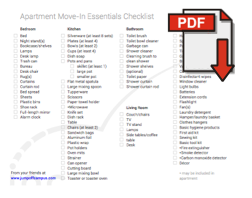Let’s be honest here: You and your roommate(s) are never going to see eye to eye on everything. Whether it is about doing dishes, who’s buying the paper towels, or whether they can have friends over at 12 am on a Tuesday night, things are going to come up that you just won’t agree on. However, you certainly don’t want to end up in a bickering match or giving each other the silent treatment for the rest of the year. This is why you need to be prepared before it comes time for you to have a talk. In an article we read at MSN.com, they gave some tips on how to talk with your roommate when problems arise:
- Avoid passive aggression. The sticky note you leave your roommate detailing their wrong doings never goes over well (beware not get yourself on this site!).
- Emphasize the positive. Before you talk with your roommate, be sure to make a list of their positive qualities. This will help to remind you what you like about them, and it will help keep you positive when you talk with them.
- Consider how you could be contributing to the situation. Usually issues in a relationship are never black and white. Maybe your roommate never does the dishes because you never do. You will want to consider how you could make changes too.
- Be prepared. NEVER GO INTO A SITUATION LIKE THIS UNPREPARED. I repeat: NEVER GO INTO A SITUATION LIKE THIS UNPREPARED. This is perhaps the most important item on this list. If you go into a situation like this with your roommate and you have not thought about what you are going to say beforehand, a myriad of (not-so-good) things can happen. However, what will most likely happen is one of two things: 1) you won’t actually say what you meant to say, or 2) you won’t say it right and it will cause more friction between you and your roommate. Be prepared! Think about what you want to say and how you want to approach the situation. You’ll also want to consider their possible reactions and how you will approach their responses. You may even want to write down some notes and practice what you’ll say beforehand. You don’t have to be afraid to talk with your roommate; you just have to be prepared.
- Pick a comfortable location and time to talk. You want to pick a time and place where both you and your roommate will be relaxed. You may even want to set up a time with your roommate to talk with them. This will help to prevent any outside influences (work, school, etc.) from affecting the outcome of your talk.
- Be tactful, even-tempered, and clear. Be clear about what you want to change, and make sure there are no “grey” areas. You want to keep a cool head and be strategic about how you say what you need to say. At least then one of you will be levelheaded.
- Use “I” statements versus “you” statements. Be sure to avoid focusing the discussion on what your roommate is doing wrong. Instead focus on how the situation and their behavior makes you feel. This way you’ll prevent them from shutting out what you are saying.
- Don’t wait too long to talk to them. Talk to them within a reasonable amount of time. If your roommate had a party while you were away, you don’t want to wait 3 months after the fact. Talk to them within a couple days of when you return. This way it will be fresh in both of your minds, and it will prevent any future incidents.



